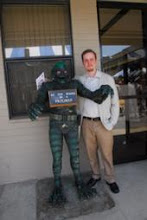Written July 4th, 2010:
This is an oldie but a goodie, written during the dark days of George Walker Bush. It's still bloody true, and I still keep hearing the same bloody drivel every Independence Day.
Before we go on to the old stuff, however, let me say a brief word about patriotism.
I consider myself a patriot.
I vote in every primary and every general election. I have tried a whopping 7 times to enlist in and, as I grew older and more grossly over-educated, to obtain a commission in all 5 branches of the US Armed forces (I've got health problems that never seem wavable). I have run candidates for political office for free or for below a living wage when I believed in what they stand for. I've registered voters. I answer calls to jury duty. I practice the civic virtues. I can list all 5 rights guaranteed in the 1st Amendment and all 8 currently sitting Supreme Court Justices (Stevens officially retired last week, Kagan has yet to be confirmed). I once found a single round of live ammunition in a parking lot and spent an hour of my life making sure it was turned in to the police in case it was associated with a crime.
But I do not consider patriotism a virtue.
It is not.
My patriotism does not make me a better person. If I'm a good person, and I hope I am, it has nothing to do with my patriotism. My patriotism merely makes me a decent citizen. There's a huge difference between the two things.
"Patriotism," as Mark Twain said, "is the last refuge of the scoundrel."
Ted Bundy, for example, was a great citizen, if you didn't know. Active in politics, attended a major party Presidential Convention, managed the Seattle office of a presidential candidate. Worked on a suicide hotline. Even worked for the Governor of Washington State.
He also had this nasty habit... you know... raping and murdering women. Lots of them.
Patriotism, it was his last refuge. In every other way, total human cancer.
That's my last word on the subject for now.
Morning all,
Well, Independence Day has come and gone yet again. And in so doing it has brought its standard quasi-patriotic fervor. I say quasi, of course, because most so-called patriots seem to understand the significance of the holiday and the principles for which it stands not at all.
Often, far too often, Independence Day is viewed as a celebration of the American military, and its sacrifices. This is completely untrue and utterly aggravating (The American military already has two such holidays to its credit and does not need a third). Independence Day commemorates the courage of a small group of politicians (who believed all standing armies were evil) and one written document· It commemorates an idea and the willingness to stand by that idea.
The idea was Liberty. In popular parlance, and though they're not the same thing, that is usually translated to Freedom.
The problem is Americans no longer have any idea what Liberty or Freedom mean. We lost track of the definitions years ago. Ever since, we've just kept unthinkingly re-using the words until they are utterly without meaning. To such a state where, if you were so inclined, you might go to Liberty College, drive on Liberty Road, roll up to Liberty Hall and never once ask yourself precisely what Liberty means. That's how vapid and hollow our usage of those words has become.
The question then is what is Liberty? What is Freedom?
Let's ignore the very real philosophical distinction between them. After all, popularly, they are used interchangeably. Let's just pretend they're the same, like everyone else does. What is the meaning?
Now I've heard over the past few years of Independence Days the same standard infuriating answers: the materialist drivel (we're free to do what we want), the cowardly drivel (we're free from the threat of our enemies), the touchy feely drivel (we're free to be what and who we want, to express ourselves) and so forth. The chief uniting factor is that this is all drivel. It has not even a jot to do with the definition of Liberty.
Without actually doing years of research into Locke and Jefferson (the philosophical masterminds of America), we can capture the thinking of the Founding Fathers. I think we can answer the question: What is Liberty?
So a working definition:
Liberty...
Is the ability to participate in the creation your own government...
To have a hand in determining which acts are lawful...
To commit any lawful act free of that government's coercion...
To be secure in your person, property and intellectual property from government interference...
To be secure in the knowledge that you have recourse to the fair and equitable processes of law, even against the government...
And the right to resist, by main force and through any necessary violence, any attempt by that government to subvert your access to the fair and equitable processes of law.
That is Liberty as our Founders envisioned it. That is Freedom.
Obviously it's not very recognizable today, but that idea and the politicians who believed in it and risked everything to stand behind it are what we celebrate on July 4th. It's a pity, I think, that most people don't understand that.
For What It's Worth,
The Egoist

No comments:
Post a Comment